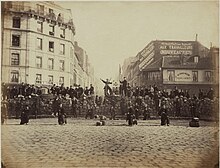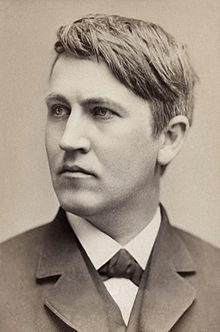"War has Always been Fought by Man and Shall Always be Fought By Man"
Anonymous
Death,war,Blood,And Hate(A Alternative World War Role play)
__________________________________________________ ________________
Much of this Information was taken from Web Sites that Are Historically Correct.
General Time Line Goes from Early 1800s to Early 1900s
With that Said Since this is First Draft ANY AND ALL INFORMATION CAN BE CHANGED AT A MOMENTS NOTICE.
Time-line(1800 to 1914)
![]()
![]()
The discoveries of Michael Faraday formed the foundation of electric motor technology
1810s
1820s
![]()
![]()
1816: Shaka rises to power over the Zulu Kingdom. Zulu expansion was a major factor of the Mfecane (“Crushing”) that depopulated large areas of southern Africa
![]()
![]()
Decembrists at the Senate Square.
1830s
![]()
![]()
The Great Exhibition in London. The United Kingdom was the first country in the world to industrialise.
![]()
![]()
The Charge of the Light Brigade during the Crimean War
1840s
1850s
![]()
![]()
Dead Confederate soldiers. 30% of all Southern white males 18–40 years of age died in theAmerican Civil War.[9]
![]()
![]()
The first vessels sail through the Suez Canal
1860s
![]()
![]()
Robert Koch discovered the tuberculosis bacilli. In the 19th century, tuberculosis killed an estimated one-quarter of the adult population of Europe.[10]
![]()
![]()
David Livingstone, Scottish explorer and missionary in Africa
![]()
![]()
From 1865-1870 Paraguay lost more than half of its population in the Paraguayan Waragainst Brazil, Argentina, and Uruguay.
![]()
![]()
Black Friday, 9 May 1873, Vienna Stock Exchange. The Panic of 1873 and Long Depressionfollowed.
1870s
1880s
![]()
![]()
First bus in history: a Benz truck modified by Netphener company (1895)
![]()
![]()
Miners and prospectors ascend the Chilkoot Trail during the Klondike Gold Rush
![]()
![]()
Studio portrait of Ilustrados in Europe, c.1890
1890s
1910s
See also: Timeline of World War I
Nations and Landshuffles
___________________________________
North America
Cofederate States of America(Southern usa)
Gains the Newfoundlandic Providences Near Central Usa
United States of America(Central Usa)
Takes all of Northern Usa
Northern Canada or Southern Canada
Takes Newfoundland and The Res of Canada
________________________________________
South America
________________________________________
Colombia
Takes Panama
Peru
Takes Ecuador
Bolivia
Takes Paraguay
Chile
Takes Nothing
Argentina(Southern or Northern)
Takes Northern or southern(Takes nothing)
Brazil(Southern,Northern or Western)
Takes Northern,southern or Western
(Takes Uruguay)
___________________________________
Europe
___________________________________
Russian Empire(Northen Russia,Ukraine, Lithuania,)
All Nations Must Pay Main Russian Government Troops and Supplies
(Russia-)
(Northern Russia-)
(Ukraine-)
(Lithuania-)
Caucasus-)
All Said Nations Can not Rebel Prior To day 4
German Empire
Takes German Lands at the time
Austro-Hungarian Empire
Takes Serbia
Italy
Takes Swisserland
French Republic
Takes Nothing
British Empire
Takes Iceland
Denmark(Greenland)
Takes Denmark
Norway
Takes Nothing
Sweden
Takes Nothing
Finland
Takes Nothing
Ottoman Empire
Takes Syria,arabia,Bulgaria
liyba(West or East)
Takes East or west Liybia
(Takes French west african Providences Below Nation)
French Algeria(East Algeria)
Takes Nothing
Spainish Algeria(West Algeria)
Takes Nothing
French West Africa(Northern Usa)
Takes Nothing
Spainish Morrocco
Takes Nothing
Loses Two Citys Near Spain Tangiers and mellilia
Spain
Takes Tangiers and Mellilia
Loses nothing
Poland(German and Russian Controlled)
Loses Nothing
Must Share Map with Both Russia and Germany
________________________________________
Asia
Japan
Takes Korea,Taiwan
Mancheria(Japan Controlled)
Loses Nothing
Gains Nothing
China(North,South,and RPC)
Loses Nothing
Gains Nothing
Mongolia
Loses nothing
Gains Nothing
French-indochina
Loses nothing
Gains hainan
Burma
Loses Nothing
Gains Nothing
British India
Takes Bangladesh,Nepal,and Bhutan
India
Takes sinkang
Loses nothing
Dutch East Indies and Federated Malay States
(Both Nations will Fight For Control of the Region)
The Nation that Wins Gains Control of the Region
_______________________________________________
ANY NATIONS NOT LISTED ABOVE CAN STILL BE PLAYED
ALSO YOU MUST POST A SAMPLE PRIOR TO BEING ADDED TO LIST OF PLAYERS IN GAMES
ALSO THIS WILL CONSIST OF THE SOUTH AMERICAN MAP,GREAT WAR MAP,AND THE SOUTH EAST ASIAN MAP
Also this is the First Draft and Changes Can be made at any time.
Anonymous
Death,war,Blood,And Hate(A Alternative World War Role play)
__________________________________________________ ________________
Much of this Information was taken from Web Sites that Are Historically Correct.
General Time Line Goes from Early 1800s to Early 1900s
With that Said Since this is First Draft ANY AND ALL INFORMATION CAN BE CHANGED AT A MOMENTS NOTICE.
Time-line(1800 to 1914)
- 1801: Giuseppe Piazzi discovers the dwarf planet Ceres.
- 1801: Thomas Jefferson elected President of the United States by the United States House of Representatives, following a tie in the Electoral College (United States)
- 1801: The Kingdom of Great Britain and the Kingdom of Ireland merge to form theUnited Kingdom.
- 1801: Ranjit Singh crowned as King of Punjab.
- 1801: Napoleon signs the Concordat of 1801 with the Pope.
- 1801: Cairo falls to the British.
- 1801: Assassination of Tsar Paul I of Russia.
- 1801: British defeat French at the Second Battle of Abukir
- 1801–15: Barbary Wars between the United States and the Barbary States of North Africa
- 1802: Treaty of Amiens between France and the United Kingdom ends the War of the Second Coalition.
- 1802: Ludwig van Beethoven performs his Moonlight Sonata for the first time.
- 1803: William Symington demonstrates his Charlotte Dundas, the "first practical steamboat".
- 1803: The United States more than doubles in size when it buys out France's territorial claims in North America via the Louisiana Purchase. This begins the U.S.'s westward expansion to the Pacific referred to as its Manifest Destiny which involvesannexing and conquering land from Mexico, Britain, and Native Americans.
- 1803: The Wahhabis of the First Saudi State capture Mecca and Medina.
- 1803: War breaks out between Britain and France; this is considered by some to be the beginning of the Napoleonic Wars.
- 1804: Haiti gains independence from France and becomes the first black republic.
- 1804-1813: Russo-Persian War.
- 1804: Austrian Empire founded by Francis I.
- 1804: Napoleon crowns himself Emperor of the French.
- 1804: World population reaches 1 billion.
- 1804: First steam locomotive begins operation.
- 1804: Morphine first isolated.
- 1804–10: Fulani Jihad in Nigeria.
- 1804–15: Serbian revolution erupts against the Ottoman rule. Suzerainty of Serbia recognized in 1817.
- 1805: The Battle of Trafalgar eliminates the French and Spanish naval fleets and allows for British dominance of the seas, a major factor for the success of the British Empire later in the century.
- 1805: Napoleon decisively defeats an Austrian-Russian army at the Battle of Austerlitz.
- 1805–48: Muhammad Ali modernizes Egypt.
- 1806: Holy Roman Empire dissolved as a consequence of the Treaty of Pressburg.
- 1806: Cape Colony becomes part of the British Empire.
- 1806-1812: Russo-Turkish War, Treaty of Bucharest.
- 1807: Britain declares the Slave Trade illegal.
- 1808: Beethoven performs his Fifth Symphony
- 1808–09: Russia conquers Finland from Sweden in the Finnish War.
- 1808–14: Spanish guerrillas fight in the Peninsular War.
- 1809: Napoleon strips the Teutonic Knights of their last holdings in Bad Mergentheim.


The discoveries of Michael Faraday formed the foundation of electric motor technology
1810s
- 1810: The University of Berlin is founded. Among its students and faculty are Hegel,Marx, and Bismarck. The German university reform proves to be so successful that its model is copied around the world (see History of European research universities).
- 1810: The Grito de Dolores begins the Mexican War of Independence.
- 1810: The Trumpet gets valves.
- 1810s–20s: Most of the Latin American colonies free themselves from the Spanish andPortuguese Empires after the Latin American wars of independence.
- 1812: The French invasion of Russia is a turning point in the Napoleonic Wars.
- 1812–15: War of 1812 between the United States and the United Kingdom
- 1813: Jane Austen publishes Pride and Prejudice
- 1814: Napoleon abdicates and is exiled to Elba.
- 1814: Elisha Haydon Collier invents the Flintlock Revolver.
- 1813–1907: The contest between the British Empire and Imperial Russia for control ofCentral Asia is referred to as the Great Game.
- 1814–16: Anglo-Nepalese War between Nepal (Gurkha Empire) and British Empire.
- 1815: The Congress of Vienna redraws the European map. The Concert of Europeattempts to preserve this settlement, but it fails to stem the tide of liberalism and nationalism that sweeps over the continent.
- 1815: Napoleon escapes exile and begins the Hundred Days before finally being defeated at the Battle of Waterloo and exiled to St Helena. His defeat brings a conclusion to the Napoleonic Wars and marks the beginning of a Pax Britannica which lasts until 1914.
- 1815: Jane Austen publishes Emma in December.
- 1816: Year Without a Summer: Unusually cold conditions wreak havoc throughout the Northern Hemisphere, likely caused by the 1815 explosion of Mount Tambora.
- 1816: Independence of Argentina
- 1816–28: Shaka's Zulu Kingdom becomes the largest in Southern Africa.
- 1817: Principality of Serbia becomes suzerain from the Ottoman Empire. Officially independent in 1867.
- 1817: First Seminole War begins in Florida.
- 1817: Russia commences its conquest of the Caucasus.
- 1818: Mary Shelley writes Frankenstein
- 1818: Independence of Chile
- 1819: Peterloo massacre in England.
- 1819: The modern city of Singapore is established by the British East India Company.
- 1819: Théodore Géricault paints his masterpiece The Raft of the Medusa, and exhibits it in the French Salon of 1819 at the Louvre.
1820s


1816: Shaka rises to power over the Zulu Kingdom. Zulu expansion was a major factor of the Mfecane (“Crushing”) that depopulated large areas of southern Africa
- 1820: Missouri Compromise
- 1820: Regency period ends in the United Kingdom
- 1820: Discovery of Antarctica
- 1820: Liberia founded by the American Colonization Society for freed American slaves.
- 1820: Dissolution of the Maratha Empire.
- 1820–35: At least 5000 Mexicans die in Apache raids, and 100 settlements are destroyed.[8]
- 1821: Mexico gains independence from Spain with the Treaty of Córdoba.
- 1821: Peru declares its independence from Spain.
- 1821: Navarino Massacre
- 1822–23: First Mexican Empire, as Mexico's first post-independent government, ruled by Emperor Agustín I of Mexico.
- 1821–30: Greece becomes the first country to break away from the Ottoman Empireafter the Greek War of Independence.
- 1822: Prince Pedro of Portugal proclaimed the Brazilian independence on September 7. On December 1, he was crowned as Emperor Dom Pedro I of Brazil.
- 1823–87: The British Empire annexed Burma (now also called Myanmar) after threeAnglo-Burmese Wars.
- 1823: Monroe Doctrine declared by US President James Monroe.
- 1824: Premiere of Beethoven's Ninth Symphony.
- 1825: Erie Canal opened connecting the Great Lakes to the Atlantic Ocean.
- 1825: First isolation of aluminum.
- 1825: Independence of Bolivia.
- 1825: The Stockton and Darlington Railway, the first public railway in the world, is opened.
- 1825: The Decembrist revolt
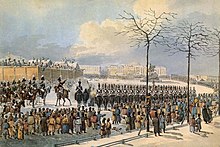

Decembrists at the Senate Square.
- 1825–28: The Cisplatine War results in the independence of Uruguay.
- 1826: Samuel Morey patents the internal combustion engine.
- 1826–28: After the final Russo-Persian War, the Persian Empire took back territory lost to Russia from the previous war.
- 1827: Death of William Blake, Ludwig van Beethoven
- 1828–1832: Black War in Tasmania leads to the near extinction of the Tasmanian aborigines
- 1829: Johann Wolfgang von Goethe's Faust premieres.
- 1829: First electric motor built.
- 1829: Sir Robert Peel founds the Metropolitan Police Service, the first modern police force.
1830s
- 1830: The Church of Jesus Christ of Latter Day Saints is established on April 6, 1830.
- 1830: July Revolution in France.
- 1830: The Belgian Revolution in the United Kingdom of the Netherlands led to the creation of Belgium.
- 1830: Greater Colombia dissolved and the nations of Colombia (including modern-day Panama), Ecuador, and Venezuela took its place.
- 1830 November Uprising in Poland against Russia.
- 1831: France invades and occupies Algeria.
- 1831: Great Bosnian uprising against Ottoman rule occurs.
- 1831–1836: Charles Darwin's journey on the HMS Beagle.
![]()
![]()
Emigrants leaving Ireland. From 1830 to 1914, almost 5 million Irish people went to the United States alone. - 1831: November Uprising ends with crushing defeat for Poland in the Battle of Warsaw.
- 1831–33: Egyptian–Ottoman War.
- 1832: The British Parliament passes the Great Reform Act.
- 1833: Slavery Abolition Act bans slavery throughout the British Empire.
- 1833–76: Carlist Wars in Spain.
- 1834: The German Customs Union is formed.
- 1834: Spanish Inquisition officially ends.
- 1834: Britain amends the Poor Law demanding that any paupers requesting assistance must go to a workhouse.
- 1834–59: Imam Shamil's rebellion in Russian-occupied Caucasus.
- 1835–36: The Texas Revolution in Mexico resulted in the short-lived Republic of Texas.
- 1836: Battle of the Alamo ends with defeat for Texan separatists.
- 1836: Battle of San Jacinto leads to the capture of General Santa Anna.
- 1836: Samuel Colt popularizes the revolver and sets up a firearms company to manufacture his invention of the Colt Paterson revolver a six bullets firearm shot one by one without reloading manually.
- 1837: Telegraphy patented.
- 1837: Charles Dickens publishes Oliver Twist
- 1837: Death of Alexander Pushkin
- 1837–1838: Rebellions of 1837 in Canada.
- 1837–1901: Queen Victoria's reign is considered the apex of the British Empire and is referred to as the Victorian era.
- 1838: By this time, 46,000 Native Americans have been forcibly relocated in the Trail of Tears.
- 1838–40: Civil war in the Federal Republic of Central America led to the foundings ofGuatemala, El Salvador, Honduras, Nicaragua, and Costa Rica.
- 1839: Kingdom of Belgium declared.
- 1839–51: Uruguayan Civil War
- 1839–60: After two Opium Wars, France, the United Kingdom, the United States and Russia gained many concessions from China resulting in the decline of the Qing Dynasty.
- 1839–1919: Anglo-Afghan Wars lead to stalemate and the establishment of theDurand line


The Great Exhibition in London. The United Kingdom was the first country in the world to industrialise.
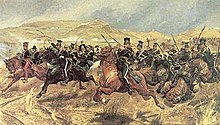

The Charge of the Light Brigade during the Crimean War
1840s
- 1840: New Zealand is founded, as the Treaty of Waitangi is signed by the Māori and British.
- 1840: Upper and Lower Canada are merged into the Province of Canada
- 1841: The word "dinosaur" is coined by Richard Owen
- 1842: Treaty of Nanking cedes Hong Kong to the British.
- 1842: Anaesthesia used for the first time.
- 1843: The first wagon train sets out from Missouri.
- 1843: Short stories A Christmas Carol and The Tell-Tale Heart published.
- 1844: Persian Prophet the Báb announces his revelation on May 23, founding Bábísm. He announced to the world of the coming of "He whom God shall make manifest". He is considered the forerunner of Bahá'u'lláh, the founder of the Bahá'í Faith.
- 1844: First publicly funded telegraph line in the world—between Baltimore and Washington—sends demonstration message on May 24, ushering in the age of the telegraph. This message read "What hath God wrought?" (Bible, Numbers 23:23)
- 1844: Millerite movement awaits the Second Advent of Jesus Christ on October 22. Christ's non-appearance becomes known as the Great Disappointment.
- 1844: The Great Auk is rendered extinct.
- 1844: Dominican War of Independence from Haiti.
- 1845: Unification of the Kingdom of Tonga under Tāufaʻāhau (King George Tupou I)
- 1845–1846: First Anglo-Sikh War
- 1845–72: The New Zealand Land Wars
- 1845–49: The Irish Potato Famine leads to the Irish diaspora.
- 1846–48: The Mexican-American War leads to Mexico's cession of much of the modern-day Southwestern United States.
- 1846–47: Mormon migration to Utah.
- 1847: The Brontë sisters publish Jane Eyre, Wuthering Heights and Agnes Grey
- 1847–1901: The Caste War of Yucatán.
- 1848–1849: Second Anglo-Sikh War
- 1848: The Communist Manifesto published.
- 1848: Revolutions of 1848 in Europe
- 1848: Seneca Falls Convention is the first women's rights convention in the United States and leads to the battle for suffrage and women's legal rights.
- 1848–58: California Gold Rush
- 1849: The first boatloads of gold prospectors arrive in California, giving them the nickname 49ers.
- 1849: The safety pin and the gas mask are invented
- 1849: Earliest recorded air raid, as Austria employs 200 balloons to deliver ordnance against Venice.
1850s


Dead Confederate soldiers. 30% of all Southern white males 18–40 years of age died in theAmerican Civil War.[9]
- 1850: The Little Ice Age ends around this time.
- 1850–1864: Taiping Rebellion is the bloodiest conflict of the century, leading to the deaths of 20 million people.
- 1851: The Great Exhibition in London was the world's first international Expo or World's Fair.
- 1851: Louis Napoleon assumes power in France in a coup.
- 1851–52: The Platine War ends and the Empire of Brazil has the hegemony over South America.
- 1851–60s: Victorian gold rush in Australia
- 1852: Frederick Douglass delivers his speech "The Meaning of July Fourth for the Negro" in Rochester, New York.
- 1853: United States Commodore Matthew C. Perry threatens the Japanese capitalEdo with gunships, demanding that they agree to open trade.
- 1853–56: Crimean War between France, the United Kingdom, the Ottoman Empire and Russia
- 1854: Battle of Balaclava and the Charge of the Light Brigade.
- 1854: The Convention of Kanagawa formally ends Japan's policy of isolation.
- 1854–1855: Siege of Sevastapol; city falls to British forces.
- 1855: Bessemer process enables steel to be mass produced.
- 1856: World's first oil refinery in Romania
- 1856: Neanderthal man first identified. Age still unknown.
- 1857–58: Indian Rebellion of 1857. The British Empire assumes control of India from the East India Company.
- 1858: Invention of the phonautograph, the first true device for recording sound.
- 1859: Charles Darwin publishes On the Origin of Species.
- 1859–1869: Suez Canal is constructed.


The first vessels sail through the Suez Canal
1860s
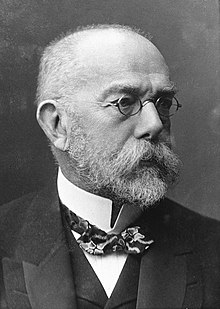

Robert Koch discovered the tuberculosis bacilli. In the 19th century, tuberculosis killed an estimated one-quarter of the adult population of Europe.[10]


David Livingstone, Scottish explorer and missionary in Africa
- 1860: Giuseppe Garibaldi launches the Expedition of the Thousand
- 1860: The Pony Express started.
- 1861–65: American Civil War between the Union and seceding Confederacy
- 1861: Russia abolishes serfdom.
- 1861–67: French intervention in Mexico and the creation of the Second Mexican Empire, ruled by Maximilian I of Mexico and his consort Carlota of Mexico.
- 1862: The Pony Express ended.
- 1862: French gain first foothold in Southeast Asia
- 1862–1877: Muslim Rebellion in northwest China.
- 1863: Bahá'u'lláh declares his station as "He whom God shall make manifest". This date is celebrated in the Bahá'í Faith as The Festival of Ridván.
- 1863: Formation of the International Red Cross is followed by the adoption of the First Geneva Convention in 1864.
- 1863: First section of the London Underground opens.
- 1863: France annexes Cambodia.
- 1863–1865: Polish uprising against the Russian Empire.
- 1864–66: The Chincha Islands War was an attempt by Spain to regain its South American colonies.
- 1864–70: The Paraguayan War ends Paraguayan ambitions for expansion and destroys much of the Paraguayan population.
- 1865–77: Reconstruction in the United States; Slavery is banned in the United States by the Thirteenth Amendment to the United States Constitution.
- 1865-April 9, 1865 Robert E. Lee Advances the Army of Northern Virginia (26,765 troops) and Defeats Ulysses S. Grant at Appomattox Courthouse, Virginia, effectively ending the American Civil War.
- 1865-April 14, 1865, United States President Abraham Lincoln is assassinated while attending a performance at Ford's Theater, Washington, D.C.. He dies approximately nine hours after being shot on April 15, 1865.Confedrate States of America Bans Slavery and Begins to recover from Civil war
- 1865: Gregor Mendel formulates his laws of inheritance
- 1866: Successful transatlantic telegraph cable follows an earlier attempt in 1858.
- 1866: Austro-Prussian War results in the dissolution of the German Confederation and the creation of the North German Confederation and the Austrian-Hungarian Dual Monarchy.
- 1866–1868: Famine in Finland.
- 1866–69: After the Meiji Restoration, Japan embarks on a program of rapidmodernization.
- 1867: The United States purchases Alaska from Russia.
- 1867: Canadian Confederation formed.
- 1867: The Principality of Serbia passes a Constitution which defines its independence from the Ottoman Empire. International recognition followed in 1878.
- 1868: The Expatriation Act of 1868 is approved by the U.S. Congress, one of the early blows which would eventually lead to the death of the common law doctrine of perpetual allegiance
- 1868: The 14th Amendment to the U.S. Constitution is approved.
- 1868: Cro-Magnon man first identified.
- 1868–1878: Ten Years' War between Cuba and Spain
- 1869: First Transcontinental Railroad completed in United States on May 10.
- 1869: Dmitri Mendeleev created the Periodic table
- 1869: The Suez Canal opens linking the Mediterranean to the Red Sea.


From 1865-1870 Paraguay lost more than half of its population in the Paraguayan Waragainst Brazil, Argentina, and Uruguay.


Black Friday, 9 May 1873, Vienna Stock Exchange. The Panic of 1873 and Long Depressionfollowed.
1870s
- 1870–71: The Franco-Prussian War results in the unifications of Germany and Italy, the collapse of the Second French Empire and the emergence of a New Imperialism.
- 1871–1872: Famine in Persia is believed to have caused the death of 2 million.
- 1871–1914: Second Industrial Revolution
- 1870s-1890s: Long Depression in Western Europe and North America
- 1871: The feudal system is dismantled in Japan.
- 1871: Henry Morton Stanley meets Dr. David Livingstone near Lake Tanganyika.
- 1872: Yellowstone National Park, the first national park, is created.
- 1872: The first recognised international soccer match, between England and Scotland, is played.
- 1873: Maxwell's A Treatise on Electricity and Magnetism published.
- 1873: The samurai class is abolished in Japan.
- 1873: Blue jeans and barbed wire are invented.
- 1874: The Société Anonyme Coopérative des Artistes Peintres, Sculpteurs, and Graveurs, better known today as the Impressionists organize and present their first public group exhibition at the Paris studio of the photographer Nadar.
- 1874: The Home Rule Movement is established in Ireland.
- 1874: The British East India Company is dissolved.
- 1874–1875: First Republic in Spain.
- 1875: HMS Challenger surveys the deepest point in the Earth's oceans, the Challenger Deep
- 1875–1900: 26 million Indians perish in India due to famine.
- 1876: Bulgarians instigate the April Uprising against Ottoman rule.
- 1876: Richard Wagner's Ring Cycle is first performed in its entirety.
- 1876: Queen Victoria becomes Empress of India.
- 1876: Battle of the Little Bighorn leads to the death of General Custer and victory for the alliance of Lakota, Cheyenne and Arapaho
- 1876–1879: 13 million Chinese die of famine in northern China.
- 1876–1914: The massive expansion in population, territory, industry and wealth in the United States is referred to as the Gilded Age.
- 1877: Great Railroad Strike in the United States may have been the world's first nationwide labor strike.
- 1877: Crazy Horse surrenders and is later killed
- 1877: Asaph Hall discovers the moons of Mars
- 1877: Thomas Edison invents the phonograph
- 1877–78: Following the Russo-Turkish War, the Treaty of Berlin recognizes formal independence of the Principality of Serbia, Montenegro and Romania. Bulgariabecomes autonomous.
- 1878: First commercial telephone exchange in New Haven, Connecticut.
![]()
![]()
A barricade in the Paris Commune, March 18, 1871. Around 30,000 Parisians were killed, and thousands more were later executed. - 1879: Anglo-Zulu War in South Africa.
- 1879: Thomas Edison tests his first light bulb
- 1879–1880: Little War against Spanish rule in Cuba leads to rebel defeat.
- 1879–83: Chile battles with Peru and Bolivia over Andean territory in the War of the Pacific.
1880s
- 1880–1881: the First Boer War.
- 1881: Tsar Alexander II is assassinated
- 1881: Wave of pogroms begins in the Russian Empire.
- 1881: Gunfight at the O.K. Corral. Sitting Bull surrenders.
- 1881: First electrical power plant and grid in Godalming, Britain.
- 1881–1899: The Mahdist War in Sudan.
- 1882: The British invasion and subsequent occupation of Egypt
- 1883: Krakatoa volcano explosion, one of the largest in modern history.
![]()
![]()
Thomas Edison was an American inventor, scientist, and businessman who developed many devices that greatly influenced life around the world, including the phonograph, the motion picture camera, and a long-lasting, practical electric light bulb. - 1883: The quagga is rendered extinct.
- 1883: Robert Lewis Stevenson's Treasure Island is published
- 1884: Siege of Khartoum
- 1884: Germany gains control of Camaroon
- 1884: Mark Twain publishes The Adventures of Huckleberry Finn.
- 1884–85: The Berlin Conference signals the start of the European "scramble for Africa". Attending nations also agree to ban trade in slaves.
- 1884–85: The Sino-French War led to the formation of French Indochina.
- 1885: King Leopold II of Belgium establishes the Congo Free State as a personal fiefdom
- 1885: Britain establishes a protectorate over Bechuanaland (modern Botswana)
- 1885: Singer begins production of the 'Vibrating Shuttle' which would become the Model T of sewing machines.
- 1886: "The Strange Case of Dr. Jekyll and Mr. Hyde" by Robert Louis Stevenson is published.
- 1886: Burma is presented to Queen Victoria as a birthday gift
- 1886: Karl Benz sells the first commercial automobile
- 1886: Construction of the Statue of Liberty; Coca-Cola is developed.
- 1886: Russian-Circassian War ended with the defeat and the exile of manyCircassians. Imam Shamil defeated.
- 1887: The British Empire takes over Balochistan
- 1887: Sir Arthur Conan Doyle publishes his first Sherlock Holmes story, A Study in Scarlet.
- 1888: Louis Le Prince records the Roundhay Garden Scene, the earliest surviving film.
- 1888: Jack the Ripper murders occur in Whitechapel, London
- 1888: Slavery banned in Brazil.
- 1889: Eiffel Tower is inaugurated in Paris.
- 1889: Mirza Ghulam Ahmad establishes the Ahmadi Muslim Community.
- 1889: End of the Brazilian Empire and the beginning of the Brazilian Republic
- 1889: Vincent van Gogh paints Starry Night
- 1889: Aspirin patented.


First bus in history: a Benz truck modified by Netphener company (1895)
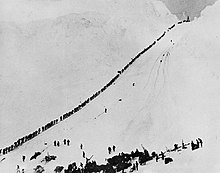

Miners and prospectors ascend the Chilkoot Trail during the Klondike Gold Rush
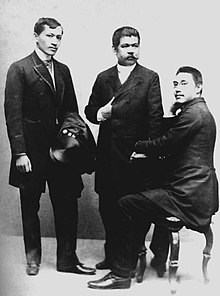

Studio portrait of Ilustrados in Europe, c.1890
1890s
- 1890: The Wounded Knee Massacre was the last battle in the American Indian Wars. This event represents the end of the American Old West.
- 1890: Italy annexes Eritrea.
- 1890: Independence of Luxembourg.
- 1890: Death of Vincent van Gogh.
- 1890: The cardboard box is invented.
- 1891: Chilean Civil War.
- 1892: Basketball is invented.
- 1892: The World's Columbian Exposition was held in Chicago celebrating the 400th anniversary of Christopher Columbus's arrival in the New World.
- 1892: Fingerprinting is officially adopted for the first time
- 1892: Tchaikovsky's Nutcracker Suite premières in St Petersberg
- 1893: US forces overthrow the government of Hawaii
- 1893: The Internal Macedonian Revolutionary Organisation is formed
- 1893: New Zealand becomes the first country to enact women's suffrage
- 1894: First commercial film release by Jean Aimé Le Roy
- 1894: First gramophone record
- 1894: France and the Russian Empire form a military alliance
- 1894–95: After the First Sino-Japanese War, China cedes Taiwan to Japan and grants Japan a free hand in Korea.
- 1895: Volleyball is invented
- 1895: Trial of Oscar Wilde and premiere of his play The Importance of Being Earnest
- 1895: French troops capture Antananarivo in Madagascar
- 1895: Wilhelm Röntgen identifies x-rays
- 1894–1900: Dreyfuss Affair
- 1895–1896: Ethiopia defeats Italy in the First Italo–Ethiopian War.
- 1895–1898: Cuban War for Independence results in Cuban independence from Spain
- 1896: Olympic Games revived in Athens.
- 1896:American Battle Fleet in the Pacific Engage the Spainish Fleets in The Pacific and Lose the Engagement.
- 1896: Ethiopia defeated Italy at the Battle of Adwa.
- 1896: Klondike Gold Rush in Canada.
- 1896: Henri Becquerel discovers radioactivity; JJ Thompson identifies the electron, though not by name.
- 1897: Gojong, or Emperor Gwangmu, proclaims the short-lived Korean Empire: lasts until 1910.
- 1897: Benin Expedition of 1897 loots and burns Benin
- 1897: Greco-Turkish War.
- 1898: The United States gains control of Cuba, Puerto Rico, During the Aftermath of the Spainish American War
- 1898: Empress Dowager Cixi of China engineers a coup d'état, marking the end of theHundred Days' Reform; the Guangxu Emperor is arrested.
- 1898: H. G. Wells publishes The War of the Worlds
- 1898–1900: The Boxer Rebellion in China is suppressed by an Eight-Nation Alliance.
- 1898–1902: The One Thousand Days war in Colombia breaks out between the "Liberales" and "Conservadores", culminating with the loss of Panama in 1903.
- 1900: Galveston Hurricane kills 8000 people. Indian famine ends.
- 1901: Boxer Rebellion ends. Death of Queen Victoria. Platt Amendment limits the autonomy of Cuba in exchange for withdrawal of US troops.
- 1902: Second Boer War ends. Cuba gains independence from the United States.Unification of Saudi Arabia begins.
- 1903: First controlled heavier-than-air flight of the Wright Brothers. Herero and Namaqua Genocide, the first genocide of the 20th century, begins in German South-West Africa. In Russia the Bolsheviks and the Mensheviks form from the breakup of the Russian Social Democratic Labor Party. Pius X becomes Pope. The teddy bear is invented. Independence of Panama.
- 1904: Entente cordiale signed between Britain and France. Russo-Japanese Warbegins. Trans-Siberian railway is completed. Construction of the Panama Canal begins.Roger Casement publishes his account of Belgian atrocities in the Congo Free State.
- 1905: Russo-Japanese War ends; 1905 Revolution in Russia. Trans-Siberian Railwayopened. Albert Einstein's formulation of relativity. Schlieffen Plan proposed. Las Vegasfounded. The British Indian Province of Bengal, was partitioned by the Viceroy of India, Lord Curzon.
- 1906: Earthquakes in San Francisco, California (death toll: 3000) and Valparaíso, Chile(death toll: 20,000) occur. Dreyfus Affair ends. Stolypin reform in Russia creates a new class of affluent kulaks. Brazilian inventor Alberto Santos-Dumont takes off and flies his 14-bis to a crowd in Paris. The Muslim League is formed by Nawab Salimullah Khan of Dacca.
- 1907: Herero and Namaqua Genocide ends. A peasants' revolt in Romania kills roughly 11,000. The Indian National Congress splits into two factions at its Surat session, presided by Rash Behari Bose.
- 1908: First commercial radio transmissions. The Ford Motor Company invents theassembly line. Boy Scouts founded. First commercial Middle-Eastern oilfield established, at Masjid-al-Salaman in southwest Persia. The Tunguska event (later conjectured to be a meteorite strike) devastates thousands of square kilometres of Siberia. Young Turk Revolution in the Ottoman Empire. Independence of Bulgaria. Pu Yi, the last Emperor of China, assumes the throne.
- 1909: United States troops leave Cuba.
1910s
See also: Timeline of World War I
- 1910: Beginning of the Mexican Revolution. George V becomes King of the United Kingdom and the British Dominions and Emperor of India. Union of South Africacreated. Portugal abolishes its Monarchy. Imperial Japan annexes Korea.
- 1911: Roald Amundsen first reaches the South Pole. New Delhi becomes the capital ofBritish India. Ernest Rutherford identifies the atomic nucleus. The British IndianProvince of Bengal is reunified
- 1912: Republic of China established and ends the Chinese Empire. The African National Congress is founded. Morocco becomes a protectorate of France. Sinking of the RMS Titanic. Balkan Wars begin. Woodrow Wilson is elected 28th President of the United States. Arizona becomes the last state to be admitted to the continental Union.
- 1913: Niels Bohr formulates the first cohesive model of the atomic nucleus, and in the process paves the way to quantum mechanics. Balkan Wars end. George I of Greeceis assassinated.
- 1914: Gavrilo Princip assassinates the Archduke Franz Ferdinand in Sarajevo, triggering World War I. The United Kingdom establishes the Sultanate of Egypt as a protectorate. Panama Canal opens. Benedict XV becomes Pope. Martha, last knownpassenger pigeon, dies.
Nations and Landshuffles
___________________________________
North America
Cofederate States of America(Southern usa)
Gains the Newfoundlandic Providences Near Central Usa
United States of America(Central Usa)
Takes all of Northern Usa
Northern Canada or Southern Canada
Takes Newfoundland and The Res of Canada
________________________________________
South America
________________________________________
Colombia
Takes Panama
Peru
Takes Ecuador
Bolivia
Takes Paraguay
Chile
Takes Nothing
Argentina(Southern or Northern)
Takes Northern or southern(Takes nothing)
Brazil(Southern,Northern or Western)
Takes Northern,southern or Western
(Takes Uruguay)
___________________________________
Europe
___________________________________
Russian Empire(Northen Russia,Ukraine, Lithuania,)
All Nations Must Pay Main Russian Government Troops and Supplies
(Russia-)
(Northern Russia-)
(Ukraine-)
(Lithuania-)
Caucasus-)
All Said Nations Can not Rebel Prior To day 4
German Empire
Takes German Lands at the time
Austro-Hungarian Empire
Takes Serbia
Italy
Takes Swisserland
French Republic
Takes Nothing
British Empire
Takes Iceland
Denmark(Greenland)
Takes Denmark
Norway
Takes Nothing
Sweden
Takes Nothing
Finland
Takes Nothing
Ottoman Empire
Takes Syria,arabia,Bulgaria
liyba(West or East)
Takes East or west Liybia
(Takes French west african Providences Below Nation)
French Algeria(East Algeria)
Takes Nothing
Spainish Algeria(West Algeria)
Takes Nothing
French West Africa(Northern Usa)
Takes Nothing
Spainish Morrocco
Takes Nothing
Loses Two Citys Near Spain Tangiers and mellilia
Spain
Takes Tangiers and Mellilia
Loses nothing
Poland(German and Russian Controlled)
Loses Nothing
Must Share Map with Both Russia and Germany
________________________________________
Asia
Japan
Takes Korea,Taiwan
Mancheria(Japan Controlled)
Loses Nothing
Gains Nothing
China(North,South,and RPC)
Loses Nothing
Gains Nothing
Mongolia
Loses nothing
Gains Nothing
French-indochina
Loses nothing
Gains hainan
Burma
Loses Nothing
Gains Nothing
British India
Takes Bangladesh,Nepal,and Bhutan
India
Takes sinkang
Loses nothing
Dutch East Indies and Federated Malay States
(Both Nations will Fight For Control of the Region)
The Nation that Wins Gains Control of the Region
_______________________________________________
ANY NATIONS NOT LISTED ABOVE CAN STILL BE PLAYED
ALSO YOU MUST POST A SAMPLE PRIOR TO BEING ADDED TO LIST OF PLAYERS IN GAMES
ALSO THIS WILL CONSIST OF THE SOUTH AMERICAN MAP,GREAT WAR MAP,AND THE SOUTH EAST ASIAN MAP
Also this is the First Draft and Changes Can be made at any time.

